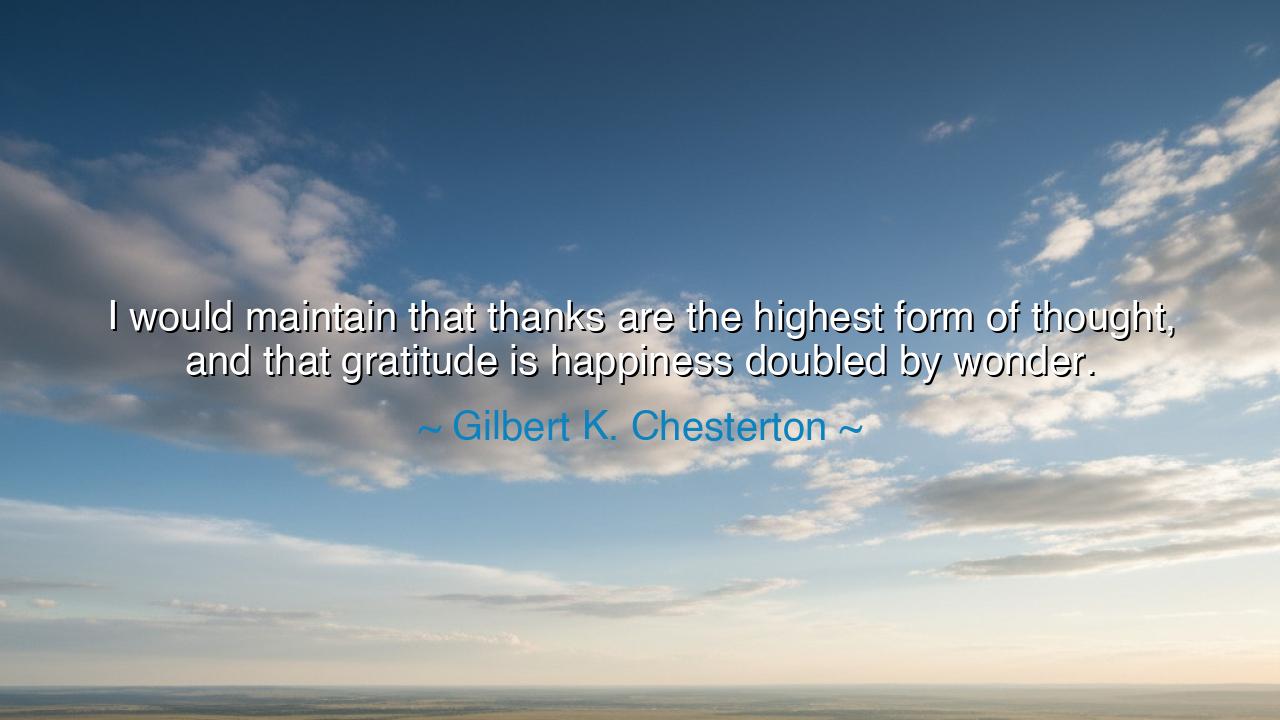
I would maintain that thanks are the highest form of thought, and
I would maintain that thanks are the highest form of thought, and that gratitude is happiness doubled by wonder.






"I would maintain that thanks are the highest form of thought, and that gratitude is happiness doubled by wonder." — Gilbert K. Chesterton
So spoke Gilbert Keith Chesterton, the English writer whose words gleam with paradox and truth, like sunlight caught on the edge of a sword. In this saying, he lifts gratitude beyond mere politeness and places it upon the throne of wisdom. To say thank you, he declares, is not a small courtesy — it is the noblest act of the human mind, the highest form of thought. For in that moment of thanksgiving, the soul rises above its hunger and ambition, and sees the world not as something to possess, but as something to marvel at. To feel gratitude is to recognize the miracle that you exist at all — and to let happiness, already full, become radiant through wonder.
To think thankfully is to think clearly. The ungrateful mind lives in darkness, seeing only what it lacks; but the grateful one lives in light, perceiving abundance even in little things. Chesterton, who found joy in the ordinary — a loaf of bread, a child’s laughter, the morning sun — knew that gratitude transforms perception. When you say “thank you,” not as a reflex but as a revelation, you acknowledge that life is not owed to you. You see, for a brief and sacred instant, that existence itself is a gift. This is why he calls thanks the highest thought — because it transcends all others. It is thought lifted into praise.
The second half of Chesterton’s saying unfolds the secret heart of gratitude: that it is “happiness doubled by wonder.” What is happiness without wonder? It is comfort, not joy. It is satisfaction, not awe. But when happiness is joined to wonder, it becomes something divine — an overflowing, trembling recognition that the good you hold is far greater than you deserve. Gratitude, then, is not only a feeling of contentment, but a vision of the miraculous. It is happiness multiplied by the awareness of how fragile and precious life truly is.
Consider the story of Helen Keller, who was both blind and deaf, cut off from the world’s sights and sounds. When her teacher, Anne Sullivan, finally broke through her isolation and taught her the word “water,” Helen felt as though her soul had awakened. Later she wrote, “Everything has its wonders, even darkness and silence, and I learn whatever state I may be in, therein to be content.” What is this but gratitude doubled by wonder? She did not merely find happiness in her triumph; she found joy in the mystery of life itself. She thanked existence not for what it gave, but for the chance to feel and know at all.
So too did Chesterton live this wisdom in his own way. A man of keen intellect and deep faith, he found wonder in the ordinary, believing that every breath was an undeserved miracle. He often said that gratitude is “the test of sanity,” for only the madman believes the world owes him everything. The wise man, on the other hand, wakes each day astonished that the sun should rise for him again. For Chesterton, the truest act of reason is not to question why good things exist, but to rejoice that they do. Thus, he links the intellect and the heart, showing that true wisdom is not cold, but filled with awe.
In this teaching lies a quiet power: gratitude is the cure for despair. When life feels empty, when sorrow presses upon the heart, one need not wait for fortune to return. One need only look — at the sky, the face of a friend, the warmth of one’s own breath — and whisper thanks. Gratitude does not deny suffering; it redeems it. For even in pain, there is something to cherish — the endurance of the soul, the lesson learned, the compassion awakened. To live with gratitude is to live as though every moment were both gift and teacher.
So, my listener of the living world, let this truth take root in you: to give thanks is to rise above complaint, to see life not as burden but as blessing. Do not wait for greatness to arrive before you give thanks — for gratitude itself makes all things great. Begin with what is near: the morning light, the hand that helps you, the breath that still sustains you. Speak your thanks aloud, and your heart will grow wide enough to hold the world.
For in the end, as Chesterton taught, gratitude is the purest wisdom and the highest joy. It is the song of the soul that knows it did not make itself, yet rejoices that it was made at all. To live in gratitude is to walk through the world like a pilgrim who marvels at every step — never tired of seeing, never done with wonder. And when the day comes that you have nothing left but the gift of being alive, let that be enough. For in that simple, sacred knowing lies the happiness doubled by wonder that turns mere existence into glory.






AAdministratorAdministrator
Welcome, honored guests. Please leave a comment, we will respond soon